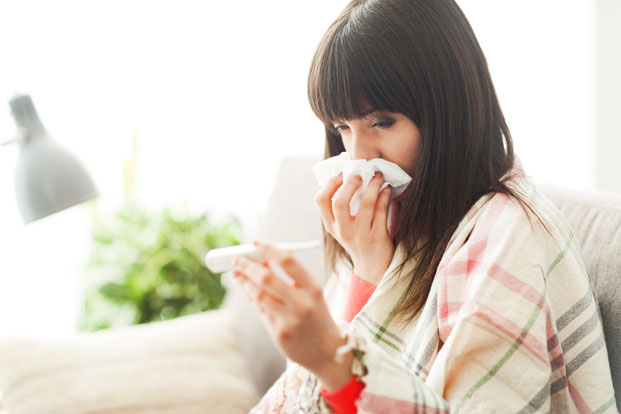Uh oh — not again.
You wake up feeling a little “off.” As the day progresses, it gets worse. Two days later, you’re hacking and sniffling. At this point, you finally face the music. A nasty cold has set in.
Seasonal colds can be a recurrent and frustrating condition. According to the Centers for Disease Control and Prevention (CDC), adults come down with two to three colds every year, and kids get them even more often. Plus, symptoms can linger for up to two weeks.
But colds aren’t the only seasonal illness that can disrupt life on a daily basis. Flu is another issue that poses a real struggle. Not only does flu feel awful, but it can also have major health consequences. The CDC says that flu can lead to pneumonia, bronchitis, sinusitis and even ear infections.
So just what do you do when colds and flu take center stage? When it comes to treating colds and flu, there are prescription, over-the-counter and holistic options that can improve symptoms. Here are seven things to try.
It’s no secret that flu symptoms can feel downright miserable. Fever and chills can turn a normally healthy household upside down. And while you most likely can recover on your own, it’s important to take extra precautions if you are elderly or have a weakened immune system.
This is when antiviral medications can be a lifesaver for those who are older or have concerning health issues. According to the CDC, antiviral drugs are particularly important for those in high-risk groups or those who are extremely ill. These are prescription medications that can take the edge off of symptoms and reduce the amount of time you’re ill. Plus, they are said to prevent pneumonia.
When it comes to antiviral drugs for flu, experts say that a course of treatment should begin within two days of symptom onset. But you can still take them if you see a doctor at a later time.
And remember, regardless of whether or not you take medications, stay put in your home for a full day after your fever breaks unless you need to go to the doctor. Further, wash your hands often and try to avoid contact with others so that you don’t infect them. Flu is contagious and shouldn’t be taken lightly.
Nasal decongestants can work wonders for clearing an airway and helping respiration while fighting a cold. That said, there are some important things to consider when using these medications.
According to Web MD, you can use nasal decongestants for up to three days, but they shouldn’t be used any longer. If you use products for a longer period, congestion can come back (and may even get worse). Plus, those with high blood pressure or cardiovascular disease shouldn’t use decongestants without first discussing this option with healthcare professionals.
And if you can’t take decongestants, consider trying a saline nasal spray. This can help to clear the nasal passages. You can find these at your drugstore of choice.
Remember when your grandmother used to gargle with salt water? Turns out, this is a great way to relieve cold symptoms.
According to Healthline, researchers have linked saltwater gargling to improved cold symptoms. That’s because salt water can relieve both a sore throat and nasal congestion, and it’s good for breaking up mucus.
Healthline says that all you have to do is add a teaspoon of salt to a glass of warm water, then gargle with the solution and spit it out.
Did you know that garlic can actually relieve with symptoms associated with cold and flu? This is a little-known secret that just may help to make cold and flu more tolerable.
According to The Dr. Oz Show, garlic may have some powerful effects when it comes to colds and flu for a very important reason. This is because garlic possesses allicin. This natural ingredient is said to boost the immune system, which can help cold and flu symptoms.
Dr. Oz says either to chop or crush one or two cloves of fresh garlic. Then “steep” the garlic in hot water, just like you would a tea bag. (P.S. Remember that your breath may be a bit rancid. Of course, you probably won’t be breathing on others when you’re sick.)
Omega-3s are heralded for their heart healthy benefits. However, they offer more than just cardiovascular perks. If you’re looking for a natural way to protect your health during cold and flu season, consider supplementing with omega-3s.
According to Prevention, omega-3s can be taken throughout the cold and flu season (or any season). Researchers say that omega-3s boost the phagocytes in your system. These are cells that do away with bacteria. Plus, omega-3s offer protective effects for fighting illness. And experts say that they may have the ability to increase airflow.
If you don’t want to take omega-3 supplements, try consuming fish a couple of times per week. Plus, remember that other foods — like flaxseeds and walnuts — contain omega-3s.
According to Healthline, honey is a great choice for fighting colds for two important reasons. It’s a natural antibacterial food, and it can relieve pain associated with sore
throats. It may even act as a cough suppressant.
Research supports this concept. In fact, Healthline reports that a study published in Pediatrics found that a bedtime treat of 10 grams of honey may be beneficial when it comes to decreasing cold symptoms in kids. Not only did cold symptoms improve, but kids also got more rest. Healthline warns that children under the age of one should not consume honey.
When the body fights off illness, it’s essential to try to get a good night’s rest. And we may need to take naps throughout the day, too. Sure, it may be tough to sleep when you’re hacking. But try to get as much rest as possible. This will give your body a leg up on recovery.

Leave a Reply